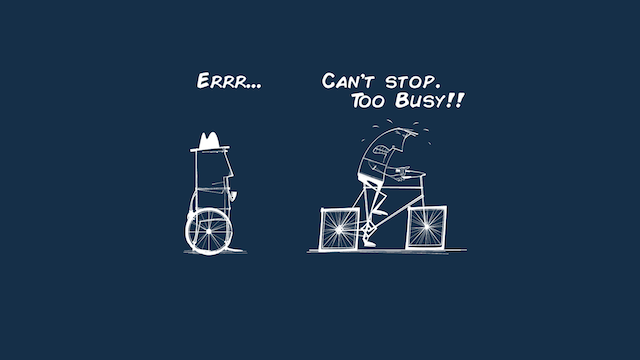A typical water-cooler conversation at a workplace may look like this:
Ben: Hi Susie! How’ve ya been? Long time, no see!
Susie: Hey Ben! Yeah, I’ve been so busy. Work has been really hectic this month!
Ben: But that’s a good thing, right? Too busy is better than not busy enough.
Susie: Oh yeah, definitely, it’s all good!
Why do we feel like we need to be busy all the time? And more than that, why do we believe it to be a virtue?
Well, because we live in a world that glorifies being busy.
In order to feel worthy and desired, we have to be and look “very busy and important.” We are so fearful of being pegged as lazy, unmotivated, and unwanted that we overcompensate by taking on projects, clients, and commitments that we know will leave us feeling overextended and drained. I know I sometimes over-schedule myself because I find it difficult to say “no”—especially to authority figures.
We have come to accept that being busy is a measure of our worth and success—not just in the workplace, but also in the realm of personal relationships: Be busy and live a full and active life, and the right partner will show up when you least expect it.
I call bullsh*t. Being too busy is not a virtue, but a vice that most of us have fallen prey to.
Let me provide a disclaimer: There will be times when being busy is unavoidable. However, to perpetually seek validation and measure our successes by our level of “busy-ness” is not something to strive for.
For being too busy, all the time, is a sign that our lives are out of balance.
It may be because we haven’t set appropriate boundaries. It may be that we haven’t been mindful about how we choose to spend our time and energy.
Or perhaps, we’re avoiding a looming issue in one area of life by focusing on another area that seems less threatening.
Regardless of the explanation behind our “busyness,” the downside of being too busy is that it can lead to exhaustion, adrenal fatigue, depression, anxiety, and an eventual loss in productivity. It also hinders creativity and innovation, as a certain level of boredom may actually enhance creativity.
Being too busy also means that we sacrifice quality for the sake of quantity. We say “yes” and commit to projects, but don’t fully follow through on them. We do the minimum possible and delegate the rest to others without providing adequate guidance or training. As a result, the final product suffers, and even if the client may not notice, the experience of working with someone who is too busy is unpleasant. In contrast, working with someone who is engaged and patient is energizing and fulfilling.
Ultimately, downtime is something that many of us need and crave, but tell ourselves we don’t deserve the luxury of having.
So what can we do instead of being too busy all the time?
For starters, don’t be afraid to say “no.” Do you really want to take on that extra project and present it at the next meeting? No? Okay, then politely decline by saying, “Thank you so much for thinking of me, but I am not able to commit to that.”
It may be difficult to get those words out the first few times if we’ve been in the habit of always saying “yes,” especially if we don’t want to disappoint others. But in reality, people won’t give it another thought, so stop worrying. There may be some who are upset at first because, in the past, you never turned them down, but they will respect you more once you set boundaries and learn to speak up for yourself.
Along the same lines, be very intentional about saying “yes.” This requires acknowledging and voicing what you want out of work, life, and your relationships. Spend some of the time you freed up by saying “no” to discover your passions and partake in activities that are aligned with those passions.
Saying “no” leaves you room to say “yes” to what you really want.
We need to be compassionate toward ourselves and let go of the need to be busy all the time. Let go of measuring our self-worth based on our numerous commitments and being pulled in different directions.
Let’s measure our success by how much we enjoy the few activities we intentionally choose, and whether we go beyond the call of duty on one project rather being fractionally present on a dozen. Let’s measure our self-worth less on what others think of us, and more on how we feel about ourselves.
Do less, live more.
~~~
~
Author: Shilpa Mirchandani
Image: Alan O’Rourke/Flickr
Editor: Callie Rushton
Copy Editor: Travis May
Social Editor: Yoli Ramazzina











Read 1 comment and reply